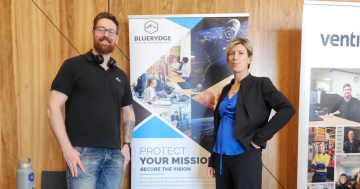Jessica Yuen* says job titles can be code for how important people think they are in an organisation, so her leadership team decided to do away with them.
 Words mean a lot at my workplace — thoughtful language creates a dialogue that helps us magnify the things we believe in.
Words mean a lot at my workplace — thoughtful language creates a dialogue that helps us magnify the things we believe in.
But right now, it’s the absence of words that’s shaping our culture.
When we were recently hiring at a particularly fast pace, a long list of labels arose for open roles — advocates, specialists, experts — and each one was causing confusion externally.
Our leadership team convened to explore the impact all these titles were having on our culture.
Yes, we knew they helped with role clarity, but they also were casting an unnecessary shadow.
When someone mentions their title in conversation, it can be code for how important they think they are in an organisation.
We really cared about the clarity part, but not the other half.
During the meeting, one of us took a provocative stance and said, “What if we got rid of titles completely? I don’t need to be called ‘CTO.’”
In that meeting, we realised: titles are not needed at our organisation.
They’re not a measurement of someone’s contributions.
They don’t make us stronger, wiser, or bring us closer to achieving our mission.
In fact, titles were adding extra layers and points of confusion.
So we decided to test it out.
Inside that conference room, the leadership team made a commitment to get rid of titles, and at the same time, everything those handful of letters represented.
A few conversations and an organisation-wide communication later, our titleless office became real.
I thought there would be an uprising after we made this decision because I can really understand the other side — people who think this change means eliminating something they’ve worked so hard in their career to achieve.
But soon after the announcement, replies started streaming in like, “This is great,” “This is so aligned with our values,” and “I’m really excited we’re trying this out and being true to who we are.”
In fact, the immediate aftermath was overwhelmingly positive.
How we went titleless
Being title-free was part of our organisation from the very beginning, but when we went through a growth spurt, titles took on a life of their own.
A long list emerged, and candidates would routinely wonder about the difference between them all.
So we asked ourselves: “How can we make the connections between people more meaningful than the names we call each other?”
“How can we get back to our titleless roots?”
To help us explore the possibility, we had a lot of internal discussions.
Does it matter if we say a role is senior or junior?
Do we have to differentiate at this stage between a backend and frontend developer?
Understanding these nuances was important to us.
Then we chatted with other organisations who had done this.
We started to learn that for small organisations with a few dozen employees, forgoing titles was a fairly common practice.
But as they grew, somehow titles snuck back into the picture.
The impact
The most immediate change is taking place in the recruiting realm.
Our hiring managers are seeing incredible people come through — people who never would’ve applied before because all the titles were preventing them from taking the leap.
During the research phase, many organisations had mentioned that they felt like they were attracting the wrong kinds of candidates when they had titles.
By not having them in the first place, you can filter those people out.
That was a really fascinating premise for us to explore.
If we’re truly a “no-egos” culture, we can zero in on the people who are more likely to thrive here.
Fewer candidates are coming through, but we’re talking to more people who are better aligned.
Going titleless has also impacted us on a psychological level.
Now someone isn’t a senior customer care advocate, they’re simply on the care team.
That slight shift in wording captures the collaborative nature of what we’re trying to accomplish.
What we’re learning
Breaking from tradition isn’t as straightforward as flipping a switch.
A few challenges come with breaking the mould:
- Right now, our job descriptions don’t always rise to the top of search results because we omit the full title from the listing, which isn’t great from an SEO perspective.
- With press, it’s often required to attach an outward title to quickly clear things up when they’re trying to attribute a quote or provide a quick description.
- We also call out leadership roles on our careers page to attract people who have experience managing others.
- Titles and career paths have never been too tied together at our organisation.
However, leaving them out has made people ask more about their paths.
To address this, we’re in the process of rolling out organisation-wide levels to mark career milestones, and coupling that with performance development programs to encourage growth and learning.
When that launches, we’ll keep an eye on how these elements intersect.
Letting go of titles has been our own quiet stake in the ground.
We remain open about this approach in the future, and recognise potential hiccoughs to come.
But we hope we can continue this approach for as long as possible.
It’s a constant reminder that we’re on the same team, united by the same purpose.
* Jessica Yuen leads the People team at Gusto.
This article first appeared at www.linkedin.com.










